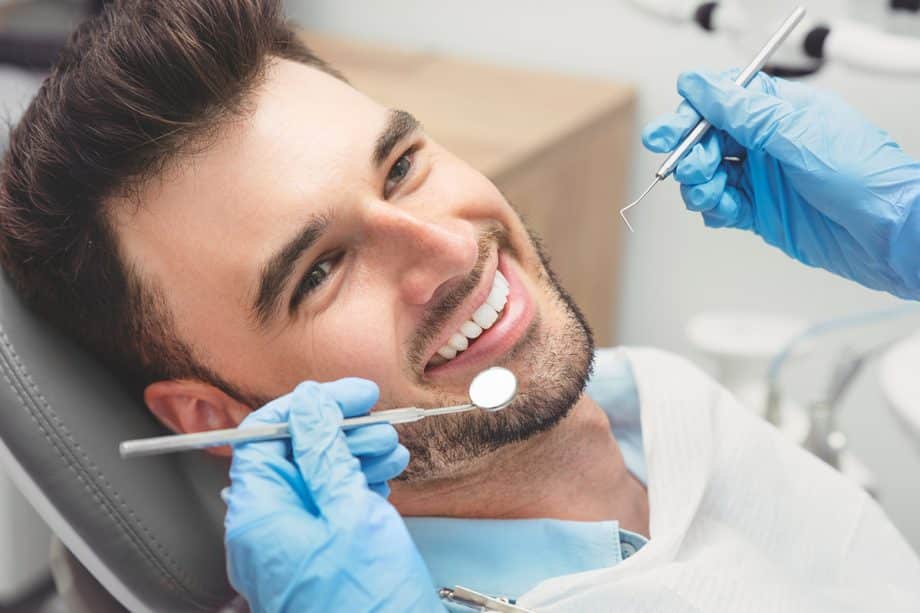Teeth cleaning is a safe procedure that most patients need twice per year. Some patients may feel uneasy about having their teeth cleaned. They may feel worried because they believe a teeth cleaning will be uncomfortable.
The short answer is that teeth cleaning should not hurt. However, if you have periodontal disease or have waited more than six months since your last cleaning appointment, you may feel discomfort due to irritated gums. Future visits will be more comfortable if you work to improve your oral health with consistent brushing and frequent flossing.
Benefits of Regular Teeth Cleaning
Prevents Tooth Decay
One of the top reasons to have your teeth cleaned is to reduce your risk of tooth decay. Tooth decay may not seem like a major problem. Left unchecked, however, it can cause problems that require costly dental work.
If you experience severe tooth decay, a root canal may save your natural tooth. The decay may progress past where a root canal will save it, leading to an extraction. If you need an extraction, you will also need an implant or bridge restoration to protect your oral health.
Protects Against Gum Disease
Only a professional can remove tartar, also known as calculus. Calculus or tartar forms when plaque bacteria and food harden and collect near and under the gumline. This substance causes gum disease because bacterial toxins inflame and break down healthy gum tissue. If you maintain a steady schedule of professional teeth cleaning, your risk of gum disease will decrease.
Detects Problems Earlier
Teeth cleaning appointments generally include comprehensive oral examinations. Your dentist or hygienist can spot early-stage trouble signs, allowing you to correct them before they become severe.
Teaches Positive Habits
Patients of all ages benefit from oral hygiene instruction. A hygienist can teach you how to fine-tune your oral care routine to maximize your returns.
How Teeth Cleaning Works
Step 1: Oral Examination
Dental hygienists usually perform cleanings. Your hygienist will examine your entire mouth, checking around the gums and teeth with a handheld mirror. They will note signs of tooth decay, gum disease, and other potential issues.
Step 2: Plaque and Tartar Removal
Using the handheld mirror, the dental hygienist uses a scaler to remove accumulated plaque and tartar. This step can take longer if you have not been to the dentist or followed an optimal at-home care routine.
Step 3: Cleaning
After removing plaque and tartar build-up, your hygienist will clean your teeth with a rotating electric brush. They will apply gritty toothpaste to polish the teeth and remove surface stains.
Step 4: Flossing
The hygienist will floss your teeth, checking for tight contacts and ensuring you can repeat the process at home. Many people do not floss as part of their daily routine; your hygienist may remind you to do so.
Step 5: Rinsing
You will probably receive a liquid fluoride rinse to remove all lingering debris from your mouth. Some practices use a water rinse.
Step 6: Fluoride
Children and adults alike can receive fluoride treatment. Fluoride hardens and remineralizes tooth enamel, making tooth decay less likely. You may be able to choose the treatment’s flavor. Fluoride is safe for all ages and has very few side effects with professional guidance.
After Your Teeth Cleaning
If your hygienist needs to scale your teeth extensively, you may have minor gum discomfort shortly after your appointment. You may also experience mild jaw soreness, but it should pass quickly. You will enjoy a brighter smile and a uniquely fresh feeling in your mouth.
Frequently Asked Questions About Teeth Cleaning
How does dental cleaning remove stains?
Polishing toothpaste contains a mild abrasive that removes surface stains. Deeper stains may require teeth whitening services, but many people see a noticeable difference in the brightness of their smile after a cleaning.
How often should I visit the dentist for teeth cleaning?
Most dentists recommend scheduling a cleaning twice annually. Some patients require dental cleanings more frequently, especially if they are prone to cavities or gum disease.
Call Dentistry of Mendham
If you feel nervous about a teeth cleaning appointment, speak to your dentist or hygienist; they will make the process as gentle as possible. You deserve a healthy smile even if you have not visited the dentist in some time. Please call Dentistry of Mendham at 973-543-5700 to schedule an appointment today.

